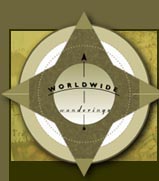Sept 27-29 St. Petersburg, RussiaAs we roll into Russia,
it seems the whole group of us (it happens that there are mostly Americans with the
exception of one young Irishman in our particular rail car) are slightly apprehensive
about actually visiting this strange place we have heard so much, but know so little,
about. Our images and ideas of this peculiar land and its different people come mostly
from old spy novels and movies. Those whose writers’ motives centered more around
melodrama than accuracy. The ever popular James Bond, for instance, was in constant effort
to save the entire free world from a simply hideous fate at the hands of some terrible
madman with horrible delusions of power via obliteration. To recall, more times than not,
this madman had communist backing a HEAVY Russian accent.
The same message was even our constant theme of the less serious, but more widely
viewed, TV sitcoms. We rooted for good ol’ Agent 99 and the bumbling, fumbling
Maxwell Smart to always save the day, and us, from our arch enemies – those blasted
Russians. It was always us against them. Good vs. evil. Capitalism vs. Communism.
And here we were, going deep behind ‘enemy’ lines. Beyond our realm of knowing,
beyond our level of understanding, and most definitely, beyond our zone of comfort. As we
sat there exchanging "I heard this . . . I heard that . . ." type stories with
one another, three guards, I’m sorry, ARMED guards came through the door from the
other car and began asking for our documents. Everyone, of course, complied with the nice
men with guns, and in turn, produced their passport and visa.
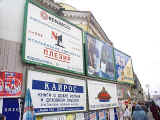 Our turn came. Laura handed them our documents.
Two of the guards then looked at me, looked at my passport, exchanged a few words in
Russian, looked at my passport again, and then once more at me. Laura seems sure that they
were trying to decide if the passport was really mine. I assert that the discussion was
probably something much more simple, such as "Hmmm, look at this. So, do you think he
looks better with, or without a beard?" Either way, they seemed satisfied with their
answer, and continued their work with the others in the car. Oh, there was one other,
teeny, tiny, little detail – they not only checked, but also kept, our passports!
Our turn came. Laura handed them our documents.
Two of the guards then looked at me, looked at my passport, exchanged a few words in
Russian, looked at my passport again, and then once more at me. Laura seems sure that they
were trying to decide if the passport was really mine. I assert that the discussion was
probably something much more simple, such as "Hmmm, look at this. So, do you think he
looks better with, or without a beard?" Either way, they seemed satisfied with their
answer, and continued their work with the others in the car. Oh, there was one other,
teeny, tiny, little detail – they not only checked, but also kept, our passports!
As we all waited eagerly to get these magical little blue booklets back, our attention
turned to the changing scenery outside our windows. It was a cold, overcast Fall day. And
while Mother Nature hadn’t changed her offering too much, mankind certainly had. Our
scenes went from charming countryside with an occasional cute, tidy, little summer cottage
here and there, to charming countryside with an occasional dilapidated, seemingly unkempt,
little house here and there. The roads that intersected with the tracks, went from paved
country lanes, to rut-filled dirt roads. Things just seemed, seemed, well - different.
Suddenly unfamiliar and uncomfortable. About that time, we were instructed, via loud
speaker, not to move, but to stay in our seats until our passports were returned to us.
Bad news – we can’t wander down to the dining car. Good news – at least
we’re getting our passports back.
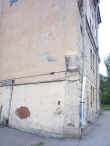 The scenery from the van for the ride from the
train station to the river boat dock was even more of the same. Everything around us
seemed old, worn out, unkempt, and sometimes, even deserted. Rather sharp contrast to our
last four weeks in Scandinavia. So far, Russia (at least this part of it) seems to be like
an old patchwork quilt. Fifty years ago, it won a prize for the best looking one in the
entire fair. One of the best in all the land. Now, fifty years later, it has become worn
with use and neglect. Its colors are muted, its fabric thin and torn. The seems are
splitting, its edges frayed. What had been a fine example of handy-work and toilsome
labor, is now more an eyesore and just barely still useful.
The scenery from the van for the ride from the
train station to the river boat dock was even more of the same. Everything around us
seemed old, worn out, unkempt, and sometimes, even deserted. Rather sharp contrast to our
last four weeks in Scandinavia. So far, Russia (at least this part of it) seems to be like
an old patchwork quilt. Fifty years ago, it won a prize for the best looking one in the
entire fair. One of the best in all the land. Now, fifty years later, it has become worn
with use and neglect. Its colors are muted, its fabric thin and torn. The seems are
splitting, its edges frayed. What had been a fine example of handy-work and toilsome
labor, is now more an eyesore and just barely still useful.
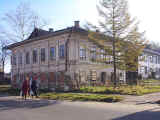 In
its time, it was arguably one of the best of its kind. Now, all that is left are the
memory of those days – of what ‘used to be’. Yet, all is not lost. For
there are still a few of those many patches with their colors still bright, with fabric
still strong. A few of the craftsmen with skills still intact, with memories long. Ready
to restore the quilt to its original glory. St. Petersburg, more than any other Russian
city, claims more than its share of these still shimmering patches.
In
its time, it was arguably one of the best of its kind. Now, all that is left are the
memory of those days – of what ‘used to be’. Yet, all is not lost. For
there are still a few of those many patches with their colors still bright, with fabric
still strong. A few of the craftsmen with skills still intact, with memories long. Ready
to restore the quilt to its original glory. St. Petersburg, more than any other Russian
city, claims more than its share of these still shimmering patches.
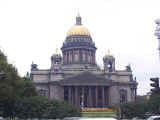 This metropolis of over five million people (the
second largest of Russia’s cities) shares the country’s problems, yet still
retains its own sense of pride. The source of this pride is clearly its museums and
historical structures.
This metropolis of over five million people (the
second largest of Russia’s cities) shares the country’s problems, yet still
retains its own sense of pride. The source of this pride is clearly its museums and
historical structures.
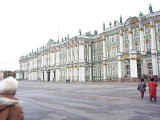 These 100 windows into the city’s (and the country’s) rich
heritage include the Hermitage, the world’s fifth best collection of
fine art. Our tour of this magnificent Palace of the Tzars and all of the national
treasures and works of art Katherine the Great began to collect, was one of many stops of
our daily excursions into the heart of the city.
These 100 windows into the city’s (and the country’s) rich
heritage include the Hermitage, the world’s fifth best collection of
fine art. Our tour of this magnificent Palace of the Tzars and all of the national
treasures and works of art Katherine the Great began to collect, was one of many stops of
our daily excursions into the heart of the city.
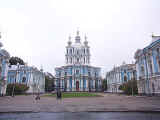 Others included Smalney Convent, St.
Issac’s Cathedral (the world’s richest with over 400 kilos of gold) and
its square complete with a tribute to one of Russia’s great leaders, Nicholas
I. The Summer Palace, City Hall, December
Square, and the Cathedral of Mother of God of Kazan (smack-dab
in the middle of town) rounded out the list.
Others included Smalney Convent, St.
Issac’s Cathedral (the world’s richest with over 400 kilos of gold) and
its square complete with a tribute to one of Russia’s great leaders, Nicholas
I. The Summer Palace, City Hall, December
Square, and the Cathedral of Mother of God of Kazan (smack-dab
in the middle of town) rounded out the list.
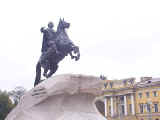 The afternoon that Laura and I spent exploring on our own
started off with a blessing-out by one of the Russian ladies that we made the mistake of
sharing a park bench with. Her dissertation of displeasure began when I stood to shoo away
a begging dog that had planted itself right in front of us to watch us eat our picnic
lunch. Our somewhat ragged, heavy set, and rather imposing, benchmate proceeded to blast
us in Russian tongue for a solid 10 minutes without, it seemed, taking a single breath.
The afternoon that Laura and I spent exploring on our own
started off with a blessing-out by one of the Russian ladies that we made the mistake of
sharing a park bench with. Her dissertation of displeasure began when I stood to shoo away
a begging dog that had planted itself right in front of us to watch us eat our picnic
lunch. Our somewhat ragged, heavy set, and rather imposing, benchmate proceeded to blast
us in Russian tongue for a solid 10 minutes without, it seemed, taking a single breath.
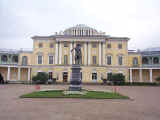 She was, in fact, so dissatisfied with our behavior, that
following our dressing, she got up and left our company. We continued to eat, and when we
were full, found that we had some fruit and yogurt left over. Convinced that our new
‘friend’ most likely lived on the street, we decided to share our snack with
her. After numerous tries to make eye contact with her from across the park (she found a
new bench and would look away each time I looked her direction), I finally caught her eye
and motioned her over. She was very surprised and somewhat suspicious until she realized
our intentions. With a huge, nearly toothless grin, she gathered her tattered belongings
and slowly made her way over to us. I have to assume that that accepting our small peace
offering was her way of forgiving us for whatever practice, custom, or unwritten rule, we
so carelessly transgressed before.
She was, in fact, so dissatisfied with our behavior, that
following our dressing, she got up and left our company. We continued to eat, and when we
were full, found that we had some fruit and yogurt left over. Convinced that our new
‘friend’ most likely lived on the street, we decided to share our snack with
her. After numerous tries to make eye contact with her from across the park (she found a
new bench and would look away each time I looked her direction), I finally caught her eye
and motioned her over. She was very surprised and somewhat suspicious until she realized
our intentions. With a huge, nearly toothless grin, she gathered her tattered belongings
and slowly made her way over to us. I have to assume that that accepting our small peace
offering was her way of forgiving us for whatever practice, custom, or unwritten rule, we
so carelessly transgressed before.
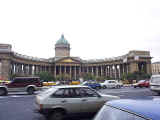 With a
grateful nod from our new friend, we’re off to explore the rest of Nevsky Prospect,
the city’s main boulevard. As we walked the street, I definitely got the feeling of
change in the air. Everything seemed in flux. Out with the old, and in with the new. There
seemed to be few, if any ‘rules’ for the new capitalists. Everyone was simply
learning as they went. You were free to set up shop anywhere you had traffic and possibly
permission. At major intersections and subway stations, there were always 4-5 street
vendors selling everything from gloves to art. We passed by women with little kittens
popping out of their coats. Very cute, and yes, very for sale. One young girl was hawking
cigarettes with an open pack of Marlboros in an outstretched hand, and a sleeping infant
in a stroller in the other (this was the closest thing to a cigarette machine we saw all
day). There were tables and tables of locals selling what looked like Russian lottery
tickets. Upon stopping to ask one of these vendors about the origin of her merchandise,
all that we could communicate was a scratch-off motion.
With a
grateful nod from our new friend, we’re off to explore the rest of Nevsky Prospect,
the city’s main boulevard. As we walked the street, I definitely got the feeling of
change in the air. Everything seemed in flux. Out with the old, and in with the new. There
seemed to be few, if any ‘rules’ for the new capitalists. Everyone was simply
learning as they went. You were free to set up shop anywhere you had traffic and possibly
permission. At major intersections and subway stations, there were always 4-5 street
vendors selling everything from gloves to art. We passed by women with little kittens
popping out of their coats. Very cute, and yes, very for sale. One young girl was hawking
cigarettes with an open pack of Marlboros in an outstretched hand, and a sleeping infant
in a stroller in the other (this was the closest thing to a cigarette machine we saw all
day). There were tables and tables of locals selling what looked like Russian lottery
tickets. Upon stopping to ask one of these vendors about the origin of her merchandise,
all that we could communicate was a scratch-off motion.
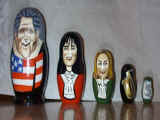 There
were, of course, large department stores. Although not department stores the way that we
think of them, their function was still the same. They were stocked with the latest
merchandise, all priced about the same as in the states. These large stores, although
housed in older structures that were clearly originally built for other purposes, seemed
to be shining examples of free enterprise. The only exception being the pricing policies
possibly being determined by the state, owner of these stores. There were also other
instances of the free market in action.
There
were, of course, large department stores. Although not department stores the way that we
think of them, their function was still the same. They were stocked with the latest
merchandise, all priced about the same as in the states. These large stores, although
housed in older structures that were clearly originally built for other purposes, seemed
to be shining examples of free enterprise. The only exception being the pricing policies
possibly being determined by the state, owner of these stores. There were also other
instances of the free market in action.
